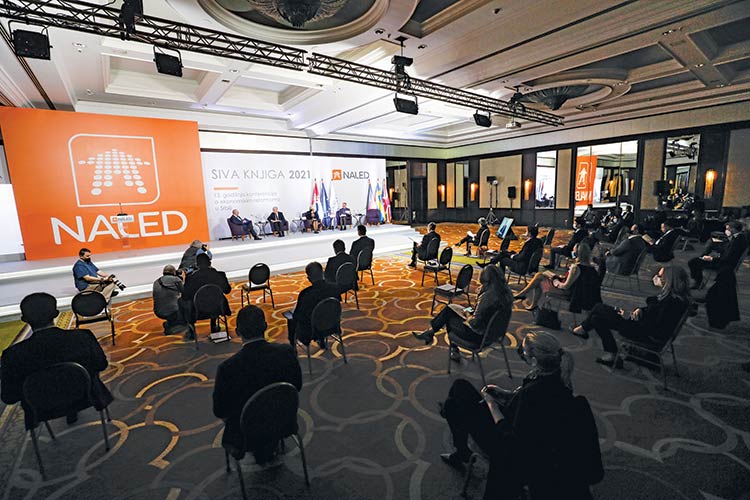What has enabled us to initiate major changes is the synergy we have created by bringing together companies, local governments and civil society, ready to dedicate their time and capacity to achieving the goals of our association, with the involvement of academia and the wider professional public
“In a society where many meddle in all trades, NALED is one of the rare organisations that does only what it knows best.“ In a sea of descriptions used for NALED, it is difficult to find one that sums us up better. Expertise, independence, innovation, integrity, courage, those are just some of the values we cherish.
We are unwaveringly persistent because we use analysis and data to offer solutions for every shortcoming we point out.
Owing to our approach, we have grown from 17 to over 310 members. We started out with one staff member only to have 80 now, and we have implemented over 160 projects to improve working conditions in Serbia. All that in just 15 years. Today, our organisation is a crucial partner of the Serbian government and institutions relevant to critical reforms of the business environment. We are members of over 50 working groups that draft regulations, and we have published over 550 research papers and similar publications that shed light on many areas that need change.
The project ‘Public-Private Dialogue for Development’ particularly stands out among other successful projects. We understood the importance of this topic for future regulation and changes to the working atmosphere, and we set out to strengthen the ability of businesses, professional associations, other civil organisations and state institutions to cooperate and create solutions together. This is the kind of reform we need most.
The advantage and strength of NALED is precisely that it has learned the importance of dialogue within its own framework. We are still the only organisation in Europe that brings together private, public and civil sectors to create better working conditions. NALED members are crucial for our involvement in reform. They analyse data, comment on regulation or draft it, provide donor support, communicate with ministries and carry out activities.

This kind of dialogue allows us to reach solutions beneficial for all sectors. Such solutions acknowledge their needs and interests and focus on the common good, rejecting individual wishes and intentions. That makes NALED’s suggestions valuable and allows them to reach decision makers.
In addition to offering solutions, NALED has another important feature, as it helps institutions implement public policies, from drafting regulations and creating software to training officials to implement new regulation.
Finally, NALED monitors how new public policies are implemented, and reacts when necessary. We act based on specific data and figures.
Dialogue within our organisation allows us to reach solutions that satisfy the needs and interests of the public, private and civil sectors, focusing on the common good
Instead of focusing on many smaller projects, we have set up our resources in a way that allows us to develop the very foundations of the Serbian business environment. Our members work together under thematic alliances focused on systemic areas, e.g. combating the grey economy, developing e-Government, reforming agriculture and healthcare, improving property relations, planning and construction, and protecting the environment. What has enabled us to initiate major changes is the synergy we have created by bringing together companies, local governments and civil society, ready to dedicate their time and capacity to achieving the goals of our association, with the involvement of academia and the wider professional public.
Another important activity consists of drafting the first strategic document on combating the grey economy and establishing the first common body for the public administration, business and the civil sector. This body would define and implement measures to reduce business ventures in the grey zone. The National Programme for Suppression of the Grey Economy has encouraged an important breakthrough, particularly for inspection reforms, digitalisation of the fiscal system, flat tax reform and registration of seasonal workers, while encouraging entrepreneurship and strengthening tax culture.
Similar results were achieved by forming a joint government group to improve Serbia’s position on the World Bank’s Doing Business List, professionally supported by NALED. This move would allow change in 10 areas important for existing businesses and potential investors, as these issues had been only selectively touched upon by individual institutions, with no interdepartmental cooperation.
Construction and issuing construction permits constitute another issue crucial for economic development. An effort to revolutionize these processes has already begun, coupled with reformed cadastre registration, urban and spatial planning, and solving legalisation and land conversion issues.
We think that similar far-reaching results will soon be achieved in other strategic areas. e-Government has come a long way, followed by digitalising agriculture and healthcare and a growing number of activities in environmental protection.
This issue is all about the Grey Book. Its contents are important and practical, but it is just one of the many ways to influence change, pinpoint obstacles to business and offer solutions. These changes were initiated by members of NALED, so don’t miss the opportunity to join NALED and write your name among the founders of the new business environment in Serbia.